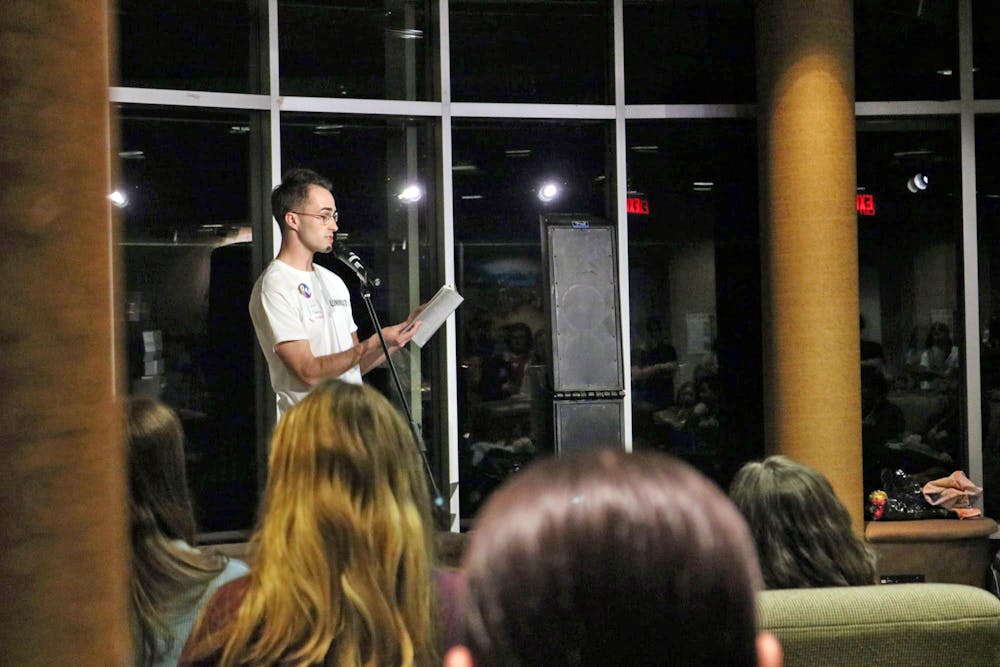Senior Jack Morrill first discovered the power in Elon’s LGBTQIA communities as a freshman, after meeting three other LGBTQIA students at Lakeside Dining Hall.
Morrill said the group talked throughout the night, staying up until at least 2 a.m. exchanging stories about their lives and identities.
“That was one of the first times I felt that sense of joy … that breathe of fresh air,” Morrill said. “I just remember that moment of, ‘This is what I’ve been looking for,’ and I’ve always searched for that since.”
The joy and understanding they experienced that night encouraged them to continue seeking community and, eventually, creating “Luminosity” — the university’s first LGBTQIA arts festival.
Over 50 Elon students across different majors came together to create, produce and perform original student pieces centered around LGBTQIA stories and communities as part of Morrill’s Lumen research project. “Luminosity” is one of two products from Morrill’s Lumen Prize research project.
The Lumen Prize is a competitive $20,000 reward that helps students pursue research and other endeavors during their junior and senior years, according to the university website.
Morrill’s research project, “Queer Theory in Arts Administrative Practices: How a Queer Values Lens Could Change the Way Theatrical Organizations Operate,” resulted in “Luminosity,” as well as a guide book Morrill said to inspire future creators to utilize queer theory and LGBTQIA values to “use non-normative practices” that create spaces for people to be themselves and engage in community.
The festival ran from Feb. 17 to 19 and was a free, three-day arts festival showcasing nine original student projects centered around LGBTQIA communities and experiences. The events included dance pieces, slam poetry, a photo exhibit, play, short film, cabaret and a drag show.
Junior Tommy Pegan co-produced the festival’s Friday night cabaret, “Beyond the Rainbow,” with sophomore Summer Severin. The cabaret took traditionally straight songs from musical theater and put an LGBTQIA spin on them, such as Pegan’s performance of “Somewhere That’s Green” from “Little Shop of Horrors.”
Pegan and Summer have been involved with Morrill’s research before Morrill even had the idea to create an arts festival with the findings.
“On top of telling queer stories, a collaborative project that’s student led in general is so absent from this campus,” Pegan said. “Not only is this happening, but it's stories that Summer and I, and many people in the performing arts, can relate to and are eager to tell.”
Severin said that working on the cabaret helped her create the representation she hopes to see in musical theater. Her and Pegan agreed that the festival created a platform for students to share their often sidelined stories and connect with one another.
Morrill is still producing the guide book, but said they hope it can be accessible to the Elon community through Belk Library and the department of performing arts once it is finished.
“The queer community has always, always survived based on its people, on its values, on its principles of love, of connection, of forming community,” Morrill said. “What if we applied those values to theater?”
Morrill, who is double majoring in acting and arts administration, said that as a performer, being openly LGBTQIA can often feel confining.
“If you’re queer, that’s the role you’re going to play,” Morrill said. “You’re just playing gay — and not human gay — stereotypical gay.”
Morrill said that in theater, LGBTQIA representation tends to only portray stereotypes and is often centered around romance. In addition, they said that working in the performing arts is often tense and unnecessarily stressful from both an acting and arts administration standpoint.
These experiences inspired them to apply for the Lumen Prize and pursue research integrating queer theory and theater production.
Morrill’s childhood friend, Kaelyn Kappas, flew to North Carolina from Salem, Oregon, to attend the festival. Kappas grew up with Morrill in San Diego and said it was important for her to show her support and see the culmination of Morrill’s research and efforts.
Kappas also said that throughout the festival she felt surrounded by joy, love and community.
“All of the performers and the creators bringing their pieces together and then of course, Jack organizing this, have done a beautiful job at bringing so many wonderful perspectives into this space, and giving them the space to breathe and shine,” Kappas said.
Pegan said he hoped the festival would challenge the audience to rethink their perception of LGBTQIA stories and stereotypes in art. He said that he and Severin specifically wanted to represent LGBTQIA stories and characters as “three dimensional” and portray narratives beyond common tropes of romance, heartbreak and loss.
Pegan said he was excited to see the impact the festival will have in the department of performing arts and on campus. He hoped the representation would help humanize LGBTQIA stories and experiences, encourage other students to share their own stories and embrace Elon’s LGBTQIA communities.
“This is gonna do so much good for this campus that I don’t think anyone participating in this festival can wrap their heads around,” Pegan said. “I know it’s going to be an incredible and important part of Elon history.”
Morrill hopes that “Luminosity” will inspire other students to continue showing up for one another, leaning into community values and creating spaces where people can be themselves. Additionally, they hope the department uses their guide book to implement better practices for Elon’s performing arts programs.
As Morrill prepares to graduate, they said that this project was one of their most impactful experiences at Elon.
“This project really made my time here feel full,” Morrill said. “I'm leaving this university with no regrets, with no what ifs, and I think that's because I was given this opportunity to create this piece of work.”


